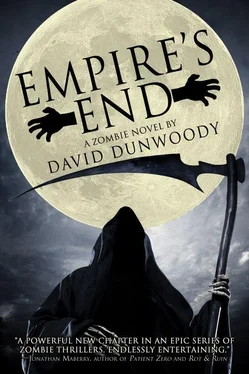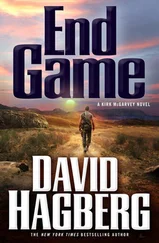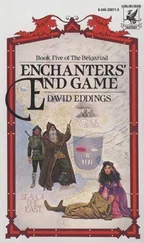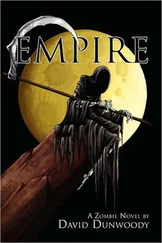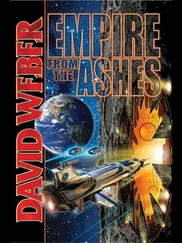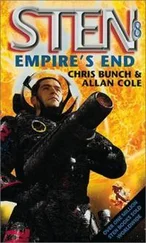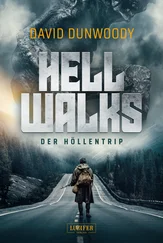“Anyway,” Bradshaw muttered, “no, I haven’t seen Postman. Why?” Postman was one of the oldest specimens on the base. In the beginning, the scientists had suited corpses up in uniforms, to better identify them regardless of physical condition. So you had Postman, Electrician, Nurse (Stoddard’s favorite) and the like. After a while it was determined that specimens weren’t around long enough to require such measures. But a few of these veteran afterdead still existed on the base, and Postman was one. He — it, rather — endured because it didn’t feed often, which made it one of the weaker and less desirable subjects. The scientists said that Postman had learned to pace himself in order to avoid being targeted. But how the hell would he — no, IT, dammit — know to do such a thing?
“Postman took a headshot last week,” Stoddard said. “He tried climbing into Grimm’s slop truck, bought himself a lobotomy. Anyway, after Grimm came back and filled out the report, we had to go find Postman and verify it. So we go to the school, and he’s in there, but not wandering the halls like usual. He’s sitting on the floor with a stick.”
“This is one hell of a story.” Bradshaw flicked a string of meat off his waders. “Let me finish,” Stoddard scowled. “Anyway, Postman’s got this stick and he’s fishing around in the bullethole. He’s trying to get the bullet out.”
“How do you know he was after the bullet? Maybe he was just poking around.”
“Yeah, sure. They don’t get bored, Ken. Anything they do, it’s for a reason.”
Not true, Bradshaw thought. All they really needed to do was eat. Didn’t breathe, didn’t fuck. They barely qualified as animals, yet some rotter sticking a twig in his brain justified a twelve-page report in triplicate. More paperwork than he’d had to fill out after two field operatives died. Behind the truck, two males bent and bloated by decay played tug-of-war over a rope of tissue. Bradshaw heaved more chum at them, and the conflict ended abruptly. As more and more feed littered the street in the truck’s wake, the afterdead were falling to their knees like supplicants. There was something familiar and troubling about it… Reminded him of Sunday worship as a kid. He’d grown up in a Texas border town, his mother a black homemaker, Dad a Venezuelan preacher. Their very own little white church seemed to absorb the dry heat, and every week Bradshaw would stand in silent awe as Dad cried from the pulpit, sweat running in rivers from his face and fists. Looking back, it wasn’t any spiritual rapture that overcame so many in the congregation — it was heat exhaustion. But to the young boy it was a power radiating from his father. Even the walls ran with moisture. It was a local phenomenon, those glistening tearstains that seemed to appear out of nowhere on the walls. Especially on Sunday: as the worshippers swayed in praise, the entire room had seemed to vibrate. Bradshaw would grip his mother’s hand, head hot and swimming, the buzzing in his ears swelling to a crescendo, and the walls wept. They wept.
In lieu of a life-size crucifix there was a stained-glass image of the Savior behind the altar, and Dad meticulously polished it every other day. Bradshaw would sit in the pews sometimes and watch. Whenever his father’s back was to him, the boy reached out and touched the tearstains. He pressed his fingertips to his nostrils; the smell was sweet, like something from his mother’s kitchen. It made perfect sense to a child that Christ’s teardrops were of sugar and syrup. His wouldn’t be bitter or salty. Lot’s wife turned to salt because she disobeyed the Lord, Dad said.
One day, when it reached 110 degrees and dusty winds battered the church, and Dad was cleaning the stained-glass window, Bradshaw had felt the room vibrate again. The walls murmured to him. He pressed his hand to them, felt it. Then he looked up and saw his father’s fear-filled eyes fixated on him.
At the joint of the west wall and the ceiling there was a hole and it was from there that the bees poured. Bradshaw made it out, Dad didn’t. They said he was allergic. They said that thousands of bees had been nesting in the walls, so many that their honey seeped through when it got hot enough. That day, Nature had delivered a judgment against God , and that was the day Bradshaw realized He was just a snake-oil salesman, manipulating forces that were already there.
* * *
The lingering odors of slop duty hadn’t yet begun to fade when Bradshaw and Stoddard were sent into the bayou to harvest. The corpses seeded the previous day were reviving. There were a finite number of these Sources in the world — places where this strange energy, like honey, seeped through the soil and reanimated the dead — one was here in Louisiana, and so the base had been established. And despite the fact that fresh specimens were returning to life at that very moment, Stoddard was going on in a loud voice about the tattoo he always talked about and never got: “Death From Above” between his shoulder blades with an image of Christ behind the lettering. It was nothing but ironic to Bradshaw considering their occupation. Slogging through a stretch of mud filled with gnarled roots (nothing ever died out here, just kept growing), he ran that by Stoddard. His companion shrugged. “We didn’t make the URC, brother, we just plug them into it.” URC — Undefined Reanimation Catalyst. Scientific term for “we have no fucking idea.”
The first afterdead of the night was chained to a gnarled monster of a tree at the edge of the mud. It stared at them, perplexed. It was male, early thirties, saliva running from its lips and a rank odor coming off its soiled jeans. “He shit himself,” Stoddard spat. “Way to go, partner!” He clapped the undead on the shoulder and detached a thick chain leash from the tree. Bradshaw trudged on to the next rotter. “I’m thinking of getting a dog.” He told Stoddard as they hauled the lot out of the bayou, through a manned gate and onto a fenced pathway. “Retriever or something.”
“You’d keep it on-base?” Stoddard raised an eyebrow. “Why not?” Bradshaw replied. “You know they don’t mess with animals. Watchdog’s not a bad idea, anyhow.” He yanked one of his chains to get a straggler moving. It lurched at him; Bradshaw was ready with the stun gun and knocked it on its ass. He jerked impatiently until the wide-eyed corpse staggered to its feet. “Maybe I’m a little lonely. That’s not a crime, right?” Stoddard nodded in understanding. They were forced to make their home next door to these things — and the kicker was, the afterdead had better digs. It was almost maddening to plod through their rosy faux-neighborhoods, to look at that all day and then go back to an 8x8 room in a bunker. Grimm, one of the base’s certified lunatics, had decided to “move out to the suburbs” and seize a home from the afterdead. He’d done it, too. Cleaned out a house near the bayou, changed the locks and brought in what little furniture he could scrounge up. He actually slept every night with afterdead pawing at his bedroom windows — but still he slept in an honest-to-God bed, in a real house. Base Commander St. John normally wouldn’t have allowed such a stunt but Ryland wanted to see the outcome.
Ryland… shit. Bradshaw realized he was late for a meeting. “Let’s pick it up Joe.”
After depositing the afterdead in a holding pen and bidding Stoddard good night, Bradshaw walked to the truck yard. His path was protected by a low-voltage electric fence from which most afterdead had learned to stay away. Halogen street lamps cast the deserted streets beyond the fence in a garish light; that light ended at the yard’s gate, where he eased himself inside. “I’m late, I know.”
Читать дальше
